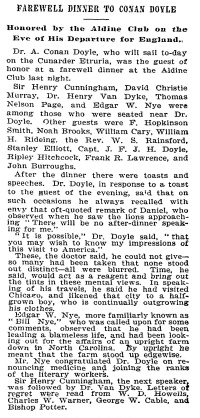Farewell Dinner to Conan Doyle
Farewell Dinner to Conan Doyle is an article published in The New-York Times on 8 december 1894.
Farewell Dinner to Conan Doyle

Honored by the Aldine Club on the Eve of His Departure for England.
Dr. A. Conan Doyle, who will sail to-day on the Cunarder Etruria, was the guest of honor at a farewell dinner at the Aldine Club last night.
Sir Henry Cunningham, David Christie Murray, Dr. Henry Van Dyke, Thomas Nelson Page, and Edgar W. Nye were among those who were seated near Dr. Doyle. Other guests were F. Hopkinson Smith, Noah Brooks, William Cary, William H. Rideing, the Rev. W. S. Rainsford, Stanley Elliott, Capt. J. F. S. H. Doyle, Ripley Hitchcock, Frank R. Lawrence, and John Burroughs.
After the dinner there were toasts and speeches. Dr. Doyle, in response to a toast to the guest of the evening, said that on such occasions he always recalled with envy that oft-quoted remark of Daniel, who observed when he saw the lions approaching "There will be no after-dinner speaking for me."
"It is possible," Dr. Doyle said, "that you may wish to know my impressions of this visit to America." These, the doctor said, he could not give — so many had been taken that none stood out distinct — all were blurred. Time, he said, would act as a reagent and bring out the tints in these mental views. In speaking of his travels, he said he had visited Chicago, and likened that city to a half-grown boy, who is continually outgrowing his clothes.
Edgar W. Nye, more familiarly known as "Bill Nye," who was called upon for some comments, observed that he had been leading a blameless life, and had been looking out for the affairs of an upright farm down in North Carolina. By upright he meant that the farm stood up edgewise. Mr. Nye congratulated Dr. Doyle on renouncing medicine and joining the ranks of the literary workers.
Sir Henry Cunningham, the next speaker, was followed by Dr. Van Dyke. Letters of regret were read from W. D. Howells, Charles W. Warner, George W. Cable, and Bishop Potter.